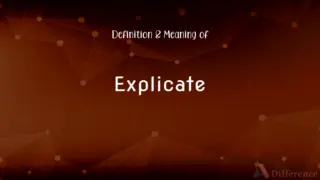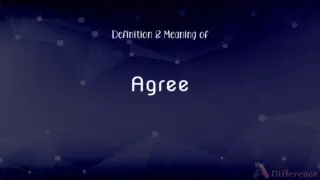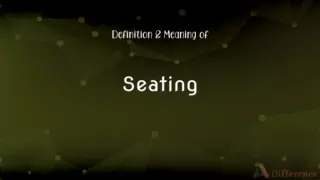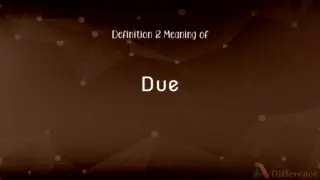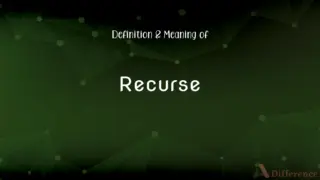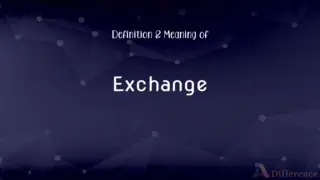Pay Definition and Meaning
By Urooj Arif & Fiza Rafique — Updated on March 5, 2024
Pay means to give money in exchange for goods, services, or to settle a debt. e.g., She had to pay the bill before leaving the restaurant.

Table of Contents
Pay Definitions
Settle a Bill: To give the required amount of money for a bill or invoice.
We need to pay the electricity bill by tomorrow.
Discharge a Debt: To completely settle a debt or loan.
She managed to pay off her student loan early.
To give money to in return for goods or services rendered
Pay the cashier.
To give (money) in exchange for goods or services
Paid four dollars for a hamburger.
Paid an hourly wage.
To discharge or settle (a debt or obligation)
Paying taxes.
Paid the bill.
To bear (a cost or penalty, for example) in recompense
She paid the price for her unpopular opinions.
To yield as a return
A savings plan that paid six percent interest.
To afford an advantage to; profit
It paid us to be generous.
To give or bestow
Paying compliments.
Paying attention.
To make (a visit or call).
Past tense and past participle paidor payed (pād) To let out (a line or cable) by slackening.
To give money in exchange for goods or services.
To discharge a debt or obligation.
To bear a cost or penalty in recompense
You'll pay for this mischief!.
To be profitable or worthwhile
It doesn't pay to get angry.
To coat or cover (seams of a ship, for example) with waterproof material such as tar or asphalt.
Of, relating to, giving, or receiving payments.
Requiring payment to use or operate
A pay toilet.
Yielding valuable metal in mining
A pay streak.
The act of paying or state of being paid.
Money given in return for work done; salary; wages.
Recompense or reward
Your thanks are pay enough.
Retribution or punishment.
Paid employment
The workers in our pay.
A person considered with regard to that person's credit or reliability in discharging debts.
(transitive) To give money or other compensation to in exchange for goods or services.
He paid him to clean the place up
He paid her off the books and in kind where possible
(ambitransitive) To discharge, as a debt or other obligation, by giving or doing what is due or required.
She offered to pay the bill
He has paid his debt to society
(transitive) To be profitable for.
It didn't pay him to keep the store open any more.
(transitive) To give (something else than money).
To pay attention
(intransitive) To be profitable or worth the effort.
Crime doesn’t pay
It will pay to wait
(intransitive) To discharge an obligation or debt.
He was allowed to go as soon as he paid.
(intransitive) To suffer consequences.
He paid for his fun in the sun with a terrible sunburn.
(transitive) To admit that a joke, punchline, etc., was funny.
I'll pay that.
To cover (the bottom of a vessel, a seam, a spar, etc.) with tar or pitch, or a waterproof composition of tallow, resin, etc.; to smear.
Money given in return for work; salary or wages.
Many employers have rules designed to keep employees from comparing their pays.
Operable or accessible on deposit of coins.
Pertaining to or requiring payment.
To cover, as bottom of a vessel, a seam, a spar, etc., with tar or pitch, or waterproof composition of tallow, resin, etc.; to smear.
To satisfy, or content; specifically, to satisfy (another person) for service rendered, property delivered, etc.; to discharge one's obligation to; to make due return to; to compensate; to remunerate; to recompense; to requite; as, to pay workmen or servants.
May no penny ale them pay [i. e., satisfy].
[She] pays me with disdain.
Hence, figuratively: To compensate justly; to requite according to merit; to reward; to punish; to retort or retaliate upon.
For which, or pay me quickly, or I'll pay you.
To discharge, as a debt, demand, or obligation, by giving or doing what is due or required; to deliver the amount or value of to the person to whom it is owing; to discharge a debt by delivering (money owed).
Have patience with me, and I will pay thee all.
If they pay this tax, they starve.
To discharge or fulfill, as a duy; to perform or render duty, as that which has been promised.
This day have I paid my vows.
To give or offer, without an implied obligation; as, to pay attention; to pay a visit.
Not paying me a welcome.
To give a recompense; to make payment, requital, or satisfaction; to discharge a debt.
The wicked borroweth, and payeth not again.
Hence, to make or secure suitable return for expense or trouble; to be remunerative or profitable; to be worth the effort or pains required; as, it will pay to ride; it will pay to wait; politeness always pays.
'T was I paid for your sleeps; I watched your wakings.
Satisfaction; content.
An equivalent or return for money due, goods purchased, or services performed; salary or wages for work or service; compensation; recompense; payment; hire; as, the pay of a clerk; the pay of a soldier.
Where only merit constant pay receives.
There is neither pay nor plunder to be got.
Something that remunerates;
Wages were paid by check
He wasted his pay on drink
They saved a quarter of all their earnings
Give money, usually in exchange for goods or services;
I paid four dollars for this sandwich
Pay the waitress, please
Convey, as of a compliment, regards, attention, etc.; bestow;
Don't pay him any mind
Give the orders
Give him my best regards
Pay attention
Do or give something to somebody in return;
Does she pay you for the work you are doing?
Bear (a cost or penalty), in recompense for some action;
You'll pay for this!
She had to pay the penalty for speaking out rashly
You'll pay for this opinion later
Cancel or discharge a debt;
Pay up, please!
Bring in;
Interest-bearing accounts
How much does this savings certificate pay annually?
Render;
Pay a visit
Pay a call
Be worth it;
It pays to go through the trouble
Dedicate;
Give thought to
Give priority to
Pay attention to
Discharge or settle;
Pay a debt
Pay an obligation
Make a compensation for;
A favor that cannot be paid back
Salary Compensation: The money received by an employee from an employer as a salary or wages.
His monthly pay was directly deposited into his bank account.
Reward or Remuneration: Money given in return for a service or achievement.
The reward pay for winning the competition was substantial.
Financial Transaction: The act of completing a purchase by transferring money.
She used her credit card to pay for the groceries.
Consequence: Suffering a loss or penalty as a result of an action.
He had to pay a fine for speeding.
Attention or Regard: To give attention, respect, or consideration to someone or something.
You should pay more attention in class.
Tribute or Respect: Showing respect or homage, often in a ceremonial way.
They gathered to pay tribute to the war heroes.
Paying Out: Distributing money, especially in large amounts or to many people.
The lottery will pay out the jackpot in annual installments.
Invest: Spending money with the expectation of achieving a benefit or profit.
It pays to invest in high-quality equipment for your business.
Pay Snonyms
Settle
Pay (a debt or account).
She settled the bill at the restaurant.
Compensate
Give (someone) something, typically money, in recognition of loss, suffering, or injury incurred.
Victims of the accident will be compensated for their injuries.
Disburse
Pay out (money from a fund).
$2 million was disbursed to cover the costs of the project.
Remunerate
Pay (someone) for services rendered or work done.
The company remunerates its employees well.
Reward
Provide (someone) with a payment for service or achievement.
The program rewards customers with points for every purchase.
Reimburse
Repay (a person who has spent or lost money).
The firm will reimburse your expenses for the business trip.
Spend
Pay out (money) in buying or hiring goods or services.
I spent too much on groceries this week.
Fork out
Pay an amount of money, especially reluctantly.
I had to fork out $50 for the repair.
Finance
Provide funding for a person or enterprise.
They financed the new building through local investors.
Cover
Provide the money necessary for (an expense).
His scholarship will cover tuition and housing.
Pay Idioms & Phrases
Pay lip service
To express loyalty, respect, or support in words but not in actions.
Politicians often pay lip service to reform without taking concrete steps.
Pay the price
To suffer the consequences of one's actions.
He paid the price for his negligence when the project failed.
Pay it forward
To respond to a person's kindness by being kind to someone else.
When a stranger paid for her coffee, she decided to pay it forward by donating to a charity.
Pay dirt
To find or discover something of value.
After years of research, the team finally hit pay dirt with their new invention.
Pay one's dues
To go through hardships before achieving success.
She paid her dues playing in small clubs before landing a record deal.
Pay through the nose
To pay an excessively high price for something.
After forgetting to book in advance, they had to pay through the nose for last-minute flight tickets.
Pay the piper
To face the consequences of one's actions, especially after enjoying oneself irresponsibly.
After partying instead of studying for finals, he had to pay the piper when he saw his grades.
Pay attention
To listen, watch, or consider something or someone carefully.
You need to pay attention in class if you want to pass the exam.
Pay homage
To show respect or honor to someone or something.
The documentary pays homage to the pioneers of jazz.
Pay off
To result in success or a benefit.
All her hard work paid off when she was accepted into her first-choice university.
Pay dividends
To bring advantages or benefits at a later time as a result of investment or effort.
Investing time in learning a new language paid dividends when she got a job overseas.
Pay one's way
To pay for oneself, rather than relying on others.
She worked part-time to pay her way through college.
Pay respects
To offer sympathy or condolences, especially at a funeral.
Many people came to pay their respects at the memorial service.
Pay the bills
To earn enough money to cover one's living expenses.
He took the job to ensure he could pay the bills, even though it wasn't his passion.
Pay a compliment
To give someone praise or admiration.
He paid her a compliment on her new dress, and she smiled in thanks.
Pay a fine
To give money as a penalty for an offense.
She had to pay a fine for parking illegally.
Pay in full
To completely settle a debt.
He finally managed to pay his student loan in full.
Pay the freight
To bear the cost or responsibility for something.
If we go to dinner, I'll pay the freight since you paid last time.
Pay one's respects
To formally show or express one's respect or condolences.
They went to pay their respects at the funeral of their beloved teacher.
Pay a visit
To visit someone or someplace, usually for a short time.
We decided to pay a visit to our grandparents over the weekend.
Pay Example Sentences
He decided to pay in cash instead of using a card.
They had to pay a hefty price for the rare book.
You'll need to pay attention if you want to understand algebra.
Always pay your bills on time to avoid late fees.
She pays a compliment to anyone who wears something nice.
They gathered at the memorial to pay their respects.
The company pays its employees every other Friday.
It's important to pay your taxes on time.
Can you pay the waiter for our meals?
The scholarship will pay for her college tuition.
It doesn't pay to ignore your health.
Parents pay for their children's education in hopes of a better future.
Sometimes, you have to pay a premium for quality.
You must pay the entry fee before joining the contest.
He pays homage to his mentor through his work.
Common Curiosities
How many syllables are in pay?
There is one syllable in pay.
What is another term for pay?
Another term for pay could be "remunerate."
What is a stressed syllable in pay?
The entire word pay is stressed, as it contains only one syllable.
What is the verb form of pay?
The verb form is "pay."
What is the singular form of pay?
As a verb, pay does not have a singular or plural form in the way nouns do; it remains "pay."
Why is it called pay?
It is called pay because it refers to the act of giving money in exchange for goods, services, or to fulfill an obligation. The term comes from the Latin word "pacare," meaning to pacify or settle a debt.
How do we divide pay into syllables?
Pay is not divided into syllables, as it is only one syllable.
How is pay used in a sentence?
"You need to pay the bill by the end of the month."
What is the first form of pay?
The first form (base form) is "pay."
What is the pronunciation of pay?
The pronunciation of pay is /peɪ/.
What is the opposite of pay?
The opposite of pay could be "withhold" or "receive."
Is pay an abstract noun?
When used as a noun, pay refers to an amount of money, which is concrete, but the concept of compensation can be considered abstract.
Is the word pay is imperative?
Yes, "pay" can be used in the imperative mood as a command, e.g., "Pay attention."
Which determiner is used with pay?
Determiners used with pay as a noun depend on the context, such as "the," "my," or "your" pay.
What is the root word of pay?
The root word of pay comes from the Latin "pacare," meaning to pacify or to settle a debt.
Is pay a countable noun?
When used as a noun, pay can be both countable and uncountable depending on the context.
What is the third form of pay?
The third form (past participle) is "paid."
What part of speech is pay?
Pay is a verb.
Is pay a noun or adjective?
Pay is primarily a verb, but it can also be a noun (as in "take-home pay").
Is pay a negative or positive word?
Pay is generally considered neutral to positive, as it often relates to receiving money or compensating someone.
Which conjunction is used with pay?
Conjunctions like "and," "or," and "but" can be used in sentences involving "pay."
What is the plural form of pay?
Not applicable, as pay is a verb and does not change form between singular and plural subjects.
Is pay a collective noun?
No, pay is not typically used as a collective noun.
Is the word “pay” a Direct object or an Indirect object?
"Pay" is a verb, so it doesn't serve as a direct or indirect object, but it can take both in a sentence, e.g., "Pay him (indirect object) the money (direct object)."
What is the second form of pay?
The second form (simple past) is "paid."
Is pay an adverb?
No, pay is not an adverb.
Is pay a vowel or consonant?
This question does not apply to the word "pay" as a whole; it pertains to individual letters.
Is the pay term a metaphor?
Pay can be used metaphorically in some contexts to signify reward or consequences.
Is the word pay Gerund?
The gerund form of pay is "paying."
Which vowel is used before pay?
Articles "a" or "an" are not typically used directly before the verb "pay."
Which preposition is used with pay?
Common prepositions used with "pay" include "for" (to pay for something) and "to" (to pay to someone).
Which article is used with pay?
When "pay" is used as a noun, articles such as "the" or "a" can be used depending on the context, e.g., "the pay is good" or "a pay increase."
Share Your Discovery

Previous Term
Wrapup Definition and Meaning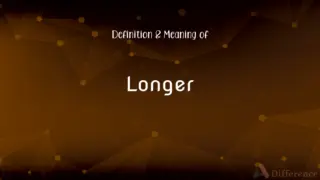
Next Term
Longer Definition and MeaningAuthor Spotlight
Written by
Urooj ArifUrooj is a skilled content writer at Ask Difference, known for her exceptional ability to simplify complex topics into engaging and informative content. With a passion for research and a flair for clear, concise writing, she consistently delivers articles that resonate with our diverse audience.
Co-written by
Fiza RafiqueFiza Rafique is a skilled content writer at AskDifference.com, where she meticulously refines and enhances written pieces. Drawing from her vast editorial expertise, Fiza ensures clarity, accuracy, and precision in every article. Passionate about language, she continually seeks to elevate the quality of content for readers worldwide.














